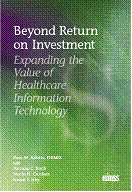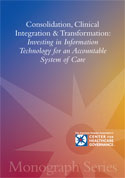Beyond Return on Investment: Expanding the Value of Healthcare Information Technology
Beyond Return on Investment expands on the topic first outlined in Return on Investment: Maximizing the Value of Healthcare Information Technology, a basic primer or “how to” on completing a ROI analysis for a single project. Beyond Return on Investment expands on the topic to address a comprehensive program of value-based information management for health systems today. Beyond Return on Investment provides lessons learned from healthcare IT adoption on how to drive value realization, look at healthcare IT as a strategic asset, achieve value from clinical systems, manage healthcare IT as an investment, analyze ROI to make the case for investment, and governing transformation toward integrated decision making. The book concludes with a look at the key trends that will drive value in the future, taking a look at IT’s impact on wellness and care delivery.
Click here to purchase your copy.
Don’t miss the next book in this series —Rethinking Return on Investment: The Challenge of Accountable Meaningful Use which provides a look back at how the ROI of health IT has typically been measured and explores how Meaningful Use regulations are driving healthcare organizations to adopt a value-based purchasing model — thus challenging readers to rethink how they define the ROI of health IT.


